Mr. A. Arulpragasam - 1955.10.01 – 1957.03.06
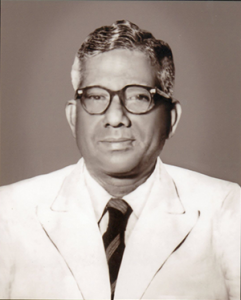
Mr. A. Arulpragasam was the first Commissioner appointed to the Department of Elections. He held office as the Commissioner of Local Authorities Elections before the appointment to this office. The third Parliamentary Election in Sri Lanka was held during his period of office. Following are the notable events that took place during his period,
1. Parliamentary Election, 1956 - This Election was held for three days.
2. The system of signing and submission of the BC Form by the householder commenced.
3. As important change took place with regard to the voters register. The register prepared in the alphabetical order was changed to the order of household numbers
Mr. E.F. Dias Abeysinghe - 1957.03.07 – 1978.03.15
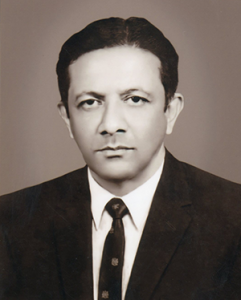
Mr. E.F. Dias Abeysinghe was appointed to the office of the Commissioner of Elections on 07-03-1957. The vacancy was created due to the retirement of Mr. Arulpragasam. Mr. Abeysinghe, who functioned on at the Commissioner for a long period, retired on 15-03-1978. This is a period of many notable changes in the Department of Elections. It was a period of introducing special laws and new features to the elections.
It is a singular feature that the functions of the Department of Elections gradually developed from its commencement. Accordingly, it is observed that he, as the Head of the Institution, worked for preparation of the legal foundation required and regularization of election management.
01. Initiation of the change of conducting Parliamentary Elections to a one day exercise. (1960 March election)
The first Parliamentary Election conducted in the year 1947 was held for 19 days. The second Parliamentary Election in 1952 was concluded in 4 days while the third Parliamentary Election 1956 was held for 3 days. Accordingly, the initiation of the conduct the election on a single day is a significant change. All Parliamentary Elections and Referendums conducted from March, 1960 todate have been conducted as one day operations.
02. Registration of political parties and introduction of the system of recognizing political parties.
03. Dispatching official poll cards to electors. Information of the date of election, polling station, registered serial number and the period for casting vote etc were notified to the elector by these poll cards.
04. Providing opportunity for persons engaged in essential duties to cast postal vote.
05. Conducting five General Elections and a number of Local Authorities Elections from 1960 upto 1977.
06. Introduction of the 1972 Republic Constitution of Sri Lanka, changes such as the appointment of a nominal President in place of the Governor General, establishment of the National State Assembly in place of Parliament, abrogation of the Upper House and changes in the Department of Elections in keeping with such developments were introduced during this period. The period of office of the National State Assembly was 6 years.
Mr. M. A. Piyasekera - 1978.03.16 – 1982.01.31
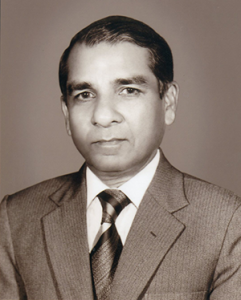
Having served as an Assistant Commissioner of Elections and Deputy Commissioner of Elections, Mr. M.A. Piyasekera was appointed to the post of Commissioner of Elections on 16-03-1978. Significant among the changes that took place in the Department of Elections during this period were,
1. Passing the 1978 Constitution of the Democratic Socialist Republic of Sri Lanka and the introduction of new systems of elections thereunder such as the Presidential Election and Referendum.
2. Introduction of a new system of marking vote to the Party while marking preference to candidates.
3. Establishment of a new category of Local Authorities by passage of the Development Councils Act no. 35 of 1980.
- Conducting the first Development Councils Elections in 1981.
After the retirement of Mr. Piyasekera two Acting Commissioners of Elections were appointed for a very short period i.e. Mr. L.A.G. Jayasekera, the Deputy Commissioner of Elections, from 10-02-1982 to 24-03-1982 and Mr. S.L. Marikkar, an Additional Secretary to the President, from 25-03-1982 to 03-05-1982.
Mr. R.K. Chandrananda de Silva - 1982.05.04 – 1995.02.18
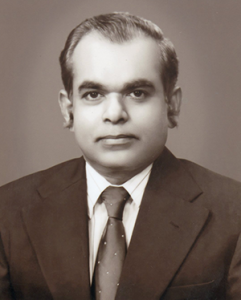
Mr. R.K. Chandrananda de Silva was appointed to the post of Commissioner of Elections on 04-05-1982. Before the appointment to the office, he had served as an Assistant Commissioner in the Department of Elections.
This was a very busy period for the Department of Elections. Various problems arose in conducting elections because the country was passing an era of political crises and violence.
With the construction of a new Elections Secretariat during this period the Department could be relieved of renting office space. Important events of this period were as follows,
1. The first Referendum (under the Referendum Act)
2. Passing Pradeshiya Sabha Act no. 15 of 1987 and passage of Pradeshiya Sabha Elections Law.
3. Passing the Provincial Councils Act No. 42 of 1987 and conducting the first Provincial Councils Election under the Provincial Councils Elections Act No. 2 of 1988. Preferential system was introduced with the Provincial Councils Election.
4. The first Presidential Election (Under the Presidential Election Act).
5. Passing the Thirteenth Amendment to the Constitution and the conduct of the Provincial Councils Election under to the Amendment.
6. Parliamentary Election, 1988. This Election was conducted under the system of Proportional Representation and Preferential system.
7. The second Provincial Councils Election.
8. The Second Presidential Election.
9.Parliamentary Election 1994
Mr. Dayananda Dissanayake - 1995.02.18 – 2011.03.26
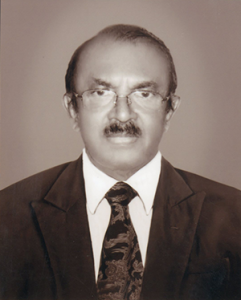
Mr. Dayananda Dissanayake was the Deputy Commissioner of Elections appointed to the office of Commissioner of Elections on 18-02-1995.
During this period a large number of elections were held i.e. Parliamentary Elections 2000 and 2004, Presidential Elections 2005 and 2010 and Provincial Councils and Local Authorities Elections.
Legal provisions were made to establish an Elections Commission in place of the Department of Elections by the 17th Amendment to the Constitution. The Constitution made provisions to establish a Commission consisting of 5 members.
Since it was mandatory to hold office until the Election Commission was established, he as the incumbent Commissioner had to remain in office for a long period. This legal requirement was removed by the 18th Amendment to the Constitution.
Mr. Mahinda Deshapriya - 2011.03.26- 2015.11.16

Mr. Mahinda Deshapriya was appointed as the sixth Commissioner of Elections on 26-03-2011. Having served in the posts of Assistant Commissioner of Elections, Deputy Commissioner of Elections and Additional Commissioner of Elections from 1983, he was a person having a long record of service in the Department. Further, Mr. Mahinda Deshapriya was the last Commissioner of the Department.
Number of new features and special functions were added to the role of the Department of Elections during this period.
1. Minimizing election offences and unlawful acts by active employment of the Police in relevant duties during the periods of election.
2. Finalizing the revision of the Electoral Register (Voters Register) and certification in 6 months which took a period of one year in the past.
3. National and district level operation of a new unit for investigating election complaints.
4. Declaring 1st June as the "Voters' Day".
5. All island operation of voter awareness programmes.
6. Sri Lanka receiving the Chairmanship of the Forum of Election Management Bodies of South Asia (FEMBOSA)
7. Conducting the 60th Anniversary of the Department of Elections.
8. A vast number of Elections i.e. Presidential Elections, Parliamentary Elections, Provincial Councils and Local Authorities Elections were conducted during his period as the Commissioner.
9. It is during this period that new legislations were formulated to set up Elections Commission by 19th Amendment to the Constitution. On the 13th November, 2015, the President appointed the Chairman and two members for the Elections Commission accordingly. With the assumption of duties by the members of the Elections Commission on 17th November, 2015, the Commission was established and the Department of Elections ceased to exist at the age of sixty.
Attorney – at – Law Nimal G. Punchihewa - 2020-2023
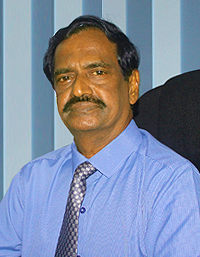
He graduated with a Bachelor of Laws degree from the University of Colombo in 1976 and sworn in as an Attorney – at – Law in the Supreme Court in 1979. Thereafter Mr. Nimal G. Punchihewa joined the Local Government Service and served as the Secretary of the Kaduwela Village Council. Then he served as the Secretary of Land Rehabilitation Commission after serving as a Member of Co-operative Employees Commission, Chairman of Ceylon Fisheries Corporation, Director of Vocational Training Authority, Vice Chairman of National Apprentice and Industrial Training Authority and Project Director, Administration and Financial Director and Additional Secretary (Legal) of Human Rights Commission.
He has published a number of books and articles in the fields of Law and Human Rights and has represented Sri Lanka in various local and foreign workshops and conferences, while contributing to the activities of a number of governmental and non-governmental organizations.
Mr. Punchihewa has served as the Legal Director of the Election Commission from 2016 until he was appointed as the Chairman of the Election Commission and assisted the Election Commission in providing legal advice and actively contributed to the drafting legislation for legal reforms on election and voter registration.
Mr. R.M.A.L. Ratnayake - Chairman, Election Commission

Mr. R.M.A.L. Ratnayake graduated from the University Peradeniya and joined the Sri Lanka Administrative Service in 1985.He served as an Assistant Commissioner of Elections in the Trincomalee, Nuwara Eliya, Puttalam and Kegalle District Elections Offices since 1986. He then worked as a Deputy Commissioner of Elections in the Kurunegala District Elections Office before being appointed as an Additional Commissioner of Elections in the Local Authorities Elections Division in 2011. He later became the first Commissioner General of Elections of the Election Commission and retired as a senior public officer with over 33 years of service in the Department of Elections and the Election Commission








